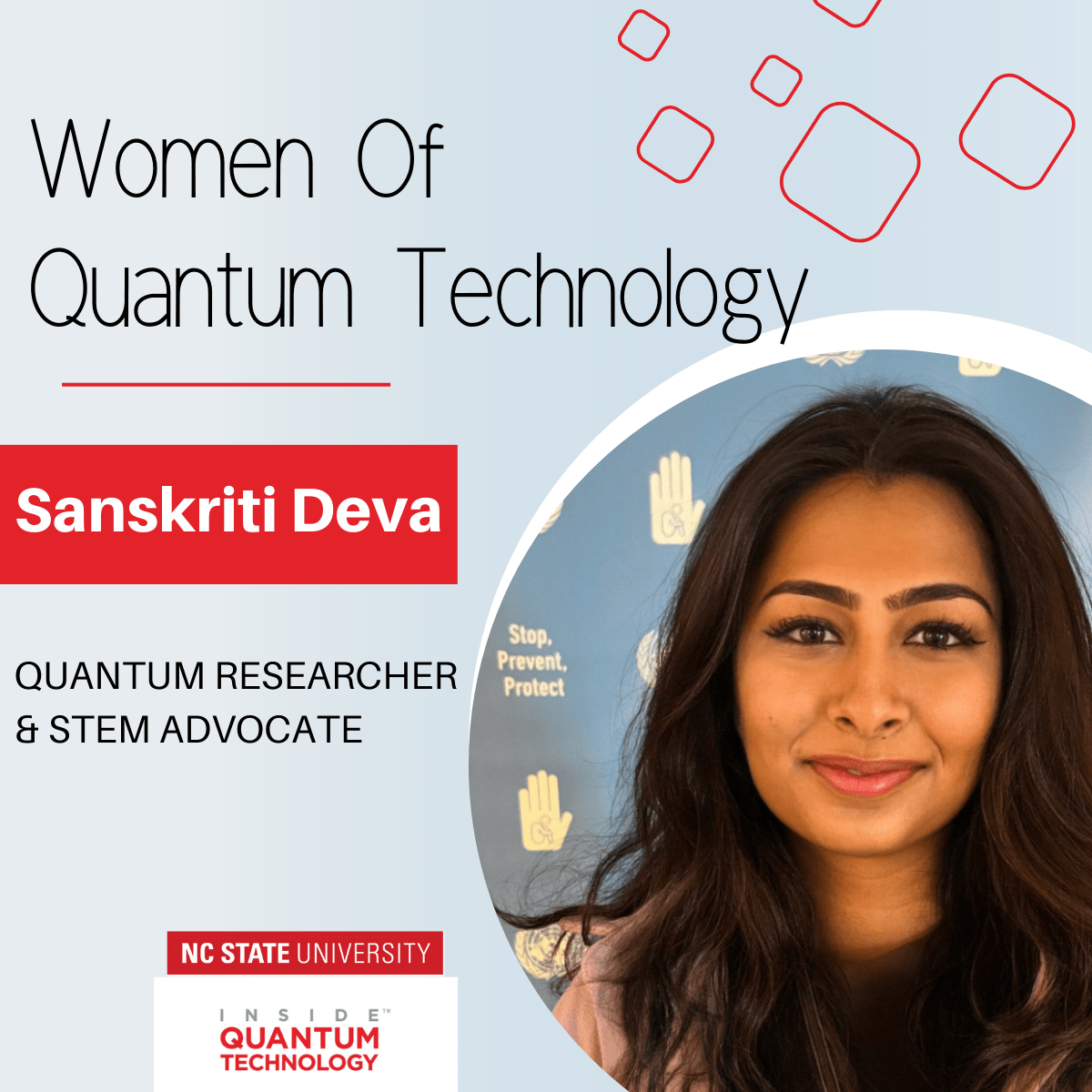Women of Quantum: Sanskriti Deva, Quantum Engineer & Youngest Elected UN Representative

It’s not surprising to find researchers inspired by science fiction. From Star Wars to the X-Files, curious minds have found themselves drawn to careers within the STEM fields. Sanskriti Deva, a quantum engineer and honors quantum computing student at North Carolina State University, found this true. “Growing up as a kid I loved Marvel movies and repeatedly kept hearing the word ‘quantum’ and wondered what that meant,” Deva explained. “After doing a lot of self-motivated research, I learned what quantum technology was, and even though it was very different from what was portrayed in Marvel movies, I was intrigued by how the field combined physics and engineering.”
For Deva, her curiosity evolved from looking at pop culture to exploring the origins of the universe. “Being able to discover new things about the universe and apply those discoveries to create never before seen technology? Sign me up, I thought,” she added. “The other thing that really drew me to the field was how potentially impactful it could be. Since quantum computing is in its very infancy, even as a young person, you can make a large impact on the direction of the field, there’s just so much to be done and uncovered, with applications in so many industries.” Deva is one of the many Gen Zers within the quantum computing community, as she is completing her Bachelor’s degree in engineering at NC State University. She finds that being a young person is a benefit, rather than a disadvantage.
Because the quantum computing field is still so nascent, Deva, like most of this ecosystem, learned through self-education and a bit of luck. As Deva explained: “I was able to enter the quantum industry because someone took a chance on me. I really didn’t know much about it, other than what I had learned through textbooks and Youtube videos, but one day I had the idea to cold email a bunch of people in the quantum industry, really anyone I could find associated with the word quantum. A couple of people responded and took me under their wing to teach me what they knew, this changed the direction of my life. They could have easily ignored my email as I was a stranger and gone about their day but the fact they took their time to mentor me will always stick with me and I cannot wait for the opportunity to pay it forward.” She has already begun to pay it forward through her partnership with the nonprofit organization “Girls in Quantum,” which resulted in an advertisement with both Deva and Girls in Quantum on a New York Times Square billboard.
Now as a quantum engineer within this community, Deva sees how her path could have been different had she not had help from her community. “I think that oftentimes there is a lot of gatekeeping in the STEM fields, which makes them really intimidating, especially to minorities and those who have never seen the world of research and innovation,” she added. “I firmly believe this mindset needs to be dismantled because true unbridled innovation comes from a diversity of thoughts and perspectives.”
While Deva actively participates in this ecosystem, she doesn’t believe she has one strict position. “I like to think of myself as a quantum bit or qubit,” Deva elaborated. “Unlike a classical bit that is a 0 or a 1, a qubit has the unique ability of being a 0 and a 1 at the same time. Like a qubit, I am a quantum engineer and an advocate at the same time, not either or. I am currently the youngest elected official on the United Nations (UN) National Council, a STEM activist, and a quantum engineer at the very beginning of my career. On paper, my work with the United Nations is very different from my work as a quantum engineer, but oftentimes as the only engineer in the room, I have been able to apply the problem-solving skills and innovative techniques I have learned in quantum engineering to my work in policy-making and advocacy, finding creative solutions to complex issues.”
Thanks to her work as the UN National Council’s youngest elected official, Deva uses her leadership to be a representative for others in many other areas. “As a STEM activist, I have been able to do a lot of international and grassroots work to make quantum computing more accessible,” she added. “Internationally I have taught over 6000+ high school and undergraduate students quantum computing and hope to teach even more students in the upcoming year by creating content on Youtube and Tiktok. Locally, [at my] university, I am President of the Quantum Computing Club and the President of Women in Electrical & Computer Engineering, growing a community that did not previously exist in both spaces through programming and workshops.” Thanks to her many efforts, Deva has found a growing community of other young Gen Zers interested in quantum computing.
Deva also found her days busy with research. “As a quantum engineer, I’ve gotten to do research in quantum hardware and the financial optimization applications of quantum computing,” She stated. “I am also currently working on a patent on a quantum musical painting I made, which is an accumulation of the hardware, software, and artistic skills I’ve been learning these past couple of years. I’m ecstatic to show the world soon.” Deva has also recently completed an internship with IBM as a Quantum Software & Design Research Intern.
Given her many different positions, from quantum engineer to UN representative, Deva has seen how important advocates can be for making the quantum ecosystem more inclusive. “Actually, I think everyone should be asking themselves every day ‘What can I personally do today to improve diversity in this industry?’” Deva explained. “Because diversity in this industry will benefit all of us and drastically improve the positive impact we have with the technology. It is amazing that quantum computing is gaining traction at a time when conversations about diversity are at the forefront, and these conversations need to continue and not be taken lightly.” To encourage these discussions, Deva suggested various methods. “A couple of ways I personally think the industry needs to improve is as it grows giving opportunities to developing countries and those in them, continuing to actively include marginalized groups such as women and people of color, and ensuring that the technology is not as intimidating as it has been marketed to be for the last couple decades,” she added. “We need to make sure that people don’t count themselves out because they think they’re not smart enough or from the ‘right’ background or too young or too old. We must ensure everyone knows they can be a quantum engineer.”
Kenna Hughes-Castleberry is a staff writer at Inside Quantum Technology and the Science Communicator at JILA (a partnership between the University of Colorado Boulder and NIST). Her writing beats include deep tech, quantum computing, and AI. Her work has been featured in Scientific American, Discover Magazine, Ars Technica, and more.



















